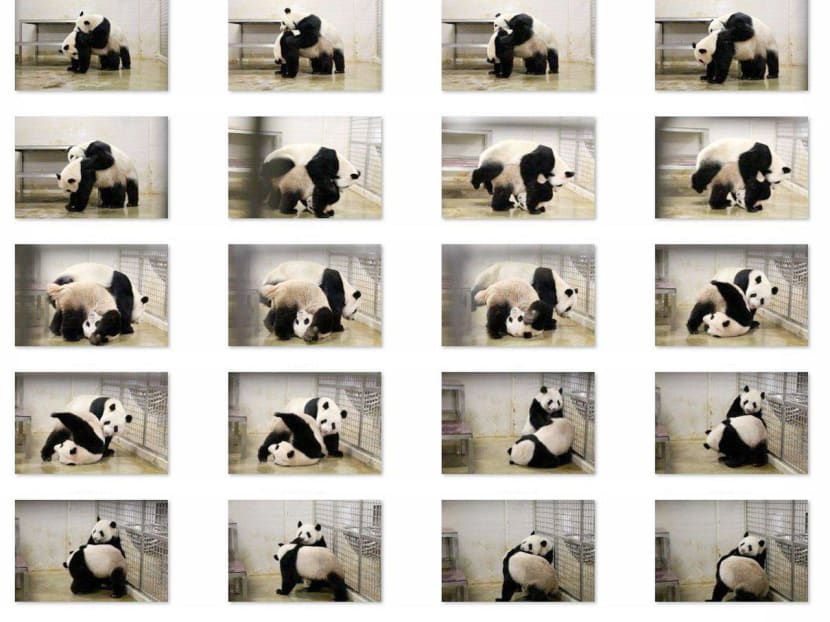Giant pandas Jia Jia and Kai Kai cross first mating season at River Safari
SINGAPORE — Notoriously difficult to breed, giant pandas Kai Kai and Jia Jia at River Safari have officially crossed their first mating season, announced Wildlife Reserves Singapore (WRS) today (April 21).

A sequence of the duo’s 40-minute mating antics captured on film on Friday (April 17). While both pandas were interested and affectionate towards each other, first-time breeders Kai Kai and Jia Jia were inexperienced during the session, and did not appear to have mated successfully. Photo: Wildlife Reserves Singapore
SINGAPORE — Notoriously difficult to breed, giant pandas Kai Kai and Jia Jia at River Safari have officially crossed their first mating season, announced Wildlife Reserves Singapore (WRS) today (April 21).
The 40-minute mating session last Friday, however, did not appear to be successful — typical for first-time breeders as they may not know how to mate — and a decision was made to artificially inseminate Jia Jia, said WRS in a statement.
“Panda reproduction is a notoriously complex process, with females ovulating once a year, in which they are fertile for only 24 to 36 hours. Jia Jia’s hormones started falling on Friday and we needed to move quickly to artificial insemination due to the short window when female pandas are able to conceive,” said Dr Serena Oh, WRS Assistant Director of Veterinary Services.
Kai Kai, 7, and Jia Jia, 6, arrived in Singapore in September 2012. They are here on a 10-year loan from China.
With pandas’ mating instincts triggered by hormonal changes in response to seasonal variations, such as temperature changes, Kai Kai and Jia Jia’s development has been an interesting case for researchers as they are the first pair of giant pandas living so close to the equator, said WRS.
Video: Ili Nadhirah bte Mansor/TODAY
The two pandas here were suitable for pairing last year but did not show signs of readiness to mate. To help, River Safari’s keepers and vets employed a number of measures since last November, such as varying the daylight hours and temperature in the panda exhibit to simulate the transition from winter to spring in the pandas’ homeland in Sichuan, China.
The pandas responded: Kai Kai started bleating and scent-marking more frequently to attract Jia Jia, which showed the first signs of coming into estrous on April 5, marked by its swollen genital, restless behaviour and hormonal analysis that indicated it was in heat, said WRS.
“The two bears were also frequently seen calling out to each other and looking through a closed gate linking their exhibit,” the statement added.
In early April, the giant pandas were frequently seen peering through the gap in the closed gate linking their exhibits, scent-marking their areas and bleating at each other.
Since April 5, six-year-old female Jia Jia started showing signs that it was in heat. It was restless, pacing in the exhibit, rolling on the ground and attempting to breach the gate connecting hers and Kai Kai’s exhibit.
On April 17, keepers brought Kai Kai and Jia Jia together for the first time in an attempt at natural mating.
On April 18, male panda Kai Kai (above) was brought into the Wildlife Healthcare and Research Centre for a health check, followed by electroejaculation which is a technique commonly used for semen collection. Jia Jia was later brought into the Wildlife Healthcare and Research Centre for artificial insemination. The vets will monitor Jia Jia for signs of pregnancy in the next few months.
(Photos: Wildlife Reserves Singapore)
Dr Cheng Wen-Haur, Chief Life Sciences Officer, Wildlife Reserves Singapore, said: “The latest development with Kai Kai and Jia Jia spells exciting times for panda researchers. They are the first pair of giant pandas to live so close to the equator, and we have shown that we can provide the right conditions to elicit mating behaviours. Maintaining a sustainable population of these critically endangered animals under human care is a crucial part of their conservation plan.”
WRS will monitor Jia Jia’s hormone levels and conduct ultrasounds to determine if the panda is pregnant. The gestation period for a panda is typically five months, and one or two cubs are usually born. Should Jia Jia give birth, the cubs will be sent back to China when they are two years old, as part of original agreement with China Wildlife Conservation Association and in line with WRS’ commitment to the conservation of endangered species.






